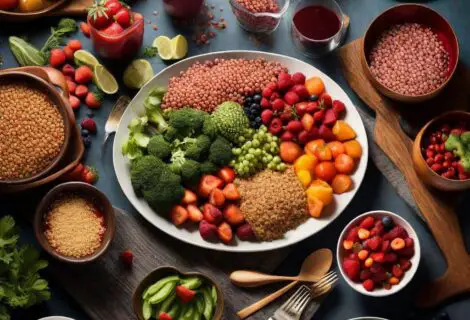The Importance of Proper Nutrition in Fitness
Introduction
In today’s fast-paced world, maintaining a healthy lifestyle has become more critical than ever. One of the key components of a healthy lifestyle is the combination of regular physical activity and proper nutrition. In this article, we will explore the importance of proper nutrition in fitness and how it can significantly impact your performance, recovery, and overall well-being. From understanding the roles of macronutrients and micronutrients to the significance of hydration, we’ll provide you with valuable insights and practical tips to optimize your nutrition plan and fuel your body for success. So let’s dive into the world of nutrition and fitness to unlock your full potential!
The Role of Proper Nutrition in Fitness
Nutrition plays a crucial role in our overall health, and it’s especially important when it comes to fitness. Whether you’re an athlete or just someone trying to stay active, proper nutrition can significantly impact your performance and results.
Energy Production
Carbohydrates, proteins, and fats are the primary sources of energy our body uses during physical activity. These macronutrients provide the fuel needed for our muscles to function and help us maintain a consistent energy level throughout our workouts.
Muscle Growth and Repair
Protein is vital for building and repairing muscle tissue, especially after a strenuous workout. Consuming adequate amounts of protein can help ensure that your body has the necessary building blocks to support muscle growth and recovery.
Hormone Regulation
Hormones play a significant role in our fitness journey, and nutrition can directly affect their production and balance. Proper nutrition helps maintain optimal hormone levels, which can contribute to better muscle growth, fat loss, and overall health.
The Power of Whole Foods Plant-Based Eating: A Lifestyle Choice
Macronutrients: The Building Blocks of Nutrition
Macronutrients are the nutrients our body needs in larger quantities to function correctly. They consist of carbohydrates, proteins, and fats.
Carbohydrates
Carbohydrates are the body’s primary source of energy. They are crucial for fueling our workouts and ensuring we have enough energy to perform at our best.
Proteins
Proteins are essential for muscle growth and repair. They provide the necessary amino acids our body needs to build and maintain muscle tissue.
Fats
Fats are another source of energy and play a vital role in hormone production and nutrient absorption. They also help protect our organs and maintain healthy skin and hair.
Micronutrients: Essential for Optimal Health
Micronutrients are the vitamins and minerals our body needs in smaller quantities but are still crucial for maintaining optimal health.
Vitamins
Vitamins play various roles in our body, from promoting immune function to maintaining healthy skin, bones, and eyes. They are essential for overall health and well-being.
Minerals
Minerals are necessary for numerous bodily functions, such as muscle contraction, nerve function, and maintaining strong bones and teeth.
Hydration: The Key to Peak Performance
Staying hydrated is essential for optimal fitness performance and overall health
The Role of Water in Fitness
Water is essential for our bodies to function properly, and it’s especially crucial during physical activity. It helps regulate body temperature, transport nutrients, and remove waste products. Dehydration can lead to decreased performance, increased fatigue, and even serious health risks.
How Much Water Do You Need?
The amount of water you need can vary depending on factors like your age, weight, activity level, and climate. A general guideline is to drink at least 8 cups (64 ounces) of water per day. However, if you’re engaged in intense physical activity or exercising in hot weather, you may need to increase your water intake to stay adequately hydrated.
Meal Timing and Frequency: Fueling Your Fitness Journey
Proper nutrition in fitness is not just about what you eat, but also when and how often you eat.
Pre- and Post-Workout Nutrition
Eating a balanced meal or snack before your workout can provide you with the energy and nutrients needed to perform at your best. Post-workout nutrition is equally important, as it aids in muscle recovery and replenishment of energy stores.
Meal Frequency and Portion Sizes
Some people prefer eating three larger meals a day, while others opt for smaller meals and snacks throughout the day. There’s no one-size-fits-all approach, but it’s essential to find a meal frequency and portion size that works best for your body and lifestyle. You may want to read this…Top 10 Tips for Creating a Balanced Meal. Plan
Common Nutritional Mistakes to Avoid
- Skipping meals: Skipping meals can lead to low energy levels and poor workout performance. It’s essential to fuel your body consistently throughout the day.
- Overloading on supplements: While supplements can be helpful, they should not replace a balanced diet. Focus on getting your nutrients from whole food sources first.
- Not paying attention to portion sizes: Overeating, even healthy foods, can lead to weight gain and hinder your fitness goals. Be mindful of your portion sizes and adjust them according to your activity level and goals.
Conclusion
Proper nutrition plays a vital role in achieving your fitness goals and maintaining overall health. By understanding the importance of macronutrients, micronutrients, hydration, and meal timing, you can optimize your nutrition plan and fuel your body for peak performance. Remember to avoid common nutritional mistakes and tailor your approach to your unique needs and lifestyle. See if you like this one…How to Stay Motivated with Your Fitness Routine.
Thank you for sticking around! We’d love to hear from you in the comments section below. Feel free to leave comments, suggestions, or share your experiences with proper nutrition and fitness. Also, please share with family and friends who may find this post useful.
FAQs
Q: How can I calculate the number of calories I need per day?
A: The number of calories you need depends on factors like your age, weight, activity level, and goals. There are various online calculators and apps that can help you determine your daily caloric needs based on these factors.
Q: Are carbohydrates bad for weight loss?
A: Carbohydrates are not inherently bad for weight loss. However, it’s essential to choose high-quality carbohydrate sources, such as whole grains, fruits, and vegetables, and monitor portion sizes.
Q: How much protein do I need to consume daily?
A: Protein needs can vary depending on factors like your age, weight, and activity level. A general guideline is to consume 0.8 grams of protein per kilogram of body weight. However, athletes and individuals engaged in intense physical activity may require more.
Q: Why is it that nutrition is the most important part of fitness?
A: Nutrition is the most important part of fitness because it fuels the body with essential nutrients, enabling optimal performance during exercise. A well-balanced diet promotes recovery, enhances muscle growth, and prevents deficiencies, ensuring overall health and well-being. Proper nutrition supports fitness goals, improving endurance, strength, and body composition.
Q: What is proper nutrition in physical fitness?
A: Proper nutrition in physical fitness involves consuming a balanced diet, comprising adequate macronutrients (proteins, carbohydrates, and fats) and micronutrients (vitamins and minerals). It prioritizes nutrient-dense whole foods, hydration, and appropriate caloric intake, tailored to individual fitness goals, energy expenditure, and personal preferences.








